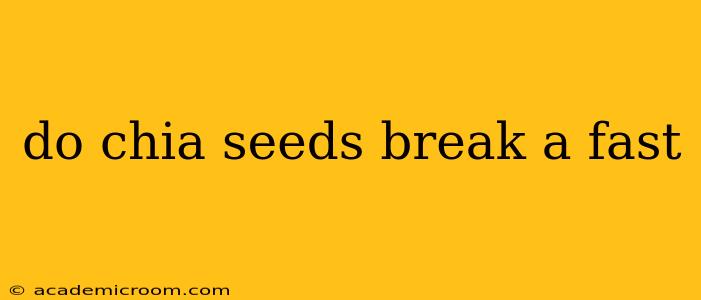Do Chia Seeds Break a Fast? Navigating the Nutritional Nuances of Intermittent Fasting
The question of whether chia seeds break a fast is a common one among intermittent fasting (IF) practitioners. The answer, unfortunately, isn't a simple yes or no. It hinges on several factors, including the type of fast you're undertaking, your individual metabolic response, and your interpretation of fasting guidelines.
Understanding Intermittent Fasting:
Intermittent fasting isn't a diet; it's an eating pattern that cycles between periods of eating and voluntary fasting on a regular schedule. Popular methods include the 16/8 method (fasting for 16 hours, eating within an 8-hour window) and the 5:2 diet (eating normally for five days and restricting calories on two non-consecutive days). The primary goal is to allow the body to utilize stored fat for energy, potentially leading to weight loss and other health benefits.
The Impact of Chia Seeds:
Chia seeds are nutritional powerhouses, packed with fiber, protein, and omega-3 fatty acids. This is precisely where the debate about their compatibility with fasting arises. While they don't contain a significant amount of calories compared to other foods, their high fiber content can stimulate digestive processes and potentially trigger insulin release, albeit mildly.
The Crucial Factors:
Several factors influence whether chia seeds break your fast:
- Calorie Intake: Even small amounts of calories can technically break a strict fast. While chia seeds are relatively low in calories, their contribution must be considered within the context of your overall caloric intake during your fasting window.
- Fiber Content: The high fiber content of chia seeds can influence your digestive system, potentially leading to a feeling of fullness and stimulating digestive hormones that might counteract the metabolic benefits of fasting. This effect isn't as pronounced as with other high-calorie foods, but it's a consideration.
- Type of Fast: The definition of "breaking a fast" varies. Some individuals interpret it strictly as consuming zero calories, while others allow for minimal calorie intake from certain foods.
- Individual Metabolic Response: Metabolic responses to food vary from person to person. What might not significantly affect one person's fast could influence another's.
H2: Do Chia Seeds Have Calories?
Yes, chia seeds do contain calories. A typical serving (one ounce or approximately 28 grams) contains around 138 calories. While this isn't a substantial amount, it's still something to account for during your fasting period, especially if you are following a strict fast with a goal of zero calorie intake.
H2: Can I Drink Chia Seed Water During a Fast?
The question of chia seed water is particularly relevant. While the seeds themselves contain calories, the water they absorb during soaking doesn't significantly add calories. However, the fibers in the seeds will still absorb water in your gut and may still trigger some digestive activity. If you are aiming for a very strict fast, even this might not be advisable.
H2: What Are the Best Alternatives to Chia Seeds During a Fast?
If you're looking for a healthy way to stay hydrated and possibly even enhance your fast, consider plain water, unsweetened tea (without milk or sugar), or black coffee. These options provide hydration without significant calorie or fiber intake that might stimulate the digestive system.
H2: Will Eating Chia Seeds Negatively Impact My Fasting Results?
It's unlikely that a small amount of chia seeds will significantly derail your fasting efforts if you are following a more lenient approach to intermittent fasting. However, if you're aiming for a strict fast with the goal of achieving a deep metabolic state of ketosis, it's advisable to avoid them to maintain the purity of your fast.
Conclusion:
The decision of whether or not to include chia seeds during your intermittent fasting period depends heavily on your personal goals and interpretation of fasting guidelines. While their nutritional benefits are undeniable, their impact on your metabolic state during a fast is nuanced. It's essential to weigh the potential benefits against the potential disruption to your fasting process. Consulting with a healthcare professional or registered dietitian can help you determine the best approach for your individual circumstances and health goals.
